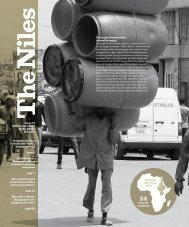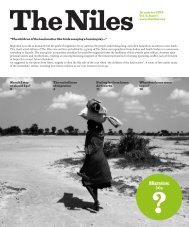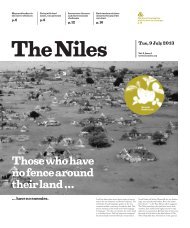When deeds speak, words are nothing
Speaking about sustainable development is easy. Acting sustainably is another matter. And now the evidence is unequivocal: Mankind’s impact on nature is causing the climate to change rapidly and drastically, threatening the environment and the very resources we need to survive. Aware that humanity is careening close to the edge, The Niles correspondents set out to explore where and how people in the Nile Basin region rethink. So much of their findings for now: We are an endlessly innovative species. Cooperation is our superpower. When deeds speak, words are nothing.
Speaking about sustainable development is easy. Acting sustainably is another matter. And now the evidence is unequivocal: Mankind’s impact on nature is causing the climate to change rapidly and drastically, threatening the environment and the very resources we need to survive. Aware that humanity is careening close to the edge, The Niles correspondents set out to explore where and how people in the Nile Basin region rethink. So much of their findings for now: We are an endlessly innovative species. Cooperation is our superpower. When deeds speak, words are nothing.
Create successful ePaper yourself
Turn your PDF publications into a flip-book with our unique Google optimized e-Paper software.
dig another well for disposing it, it could
penetrate the underground water that we
drink,” Moses warns.
The waste problem
Plastic waste, especially bottles and bags,
constitute most of Juba’s litter. In the absence
of organised waste disposal, trash is dumped
across roads, markets, residential areas and
many undesignated dumping sites.
While Juba’s authorities make an effort
to collect some of the garbage daily, it is then
dumped along some major roads just a few
miles away from the capital. Many poor and
vulnerable people – children and women
mostly – are often seen at the dumping sites
to collect items, including plastic bottles.
Besides polluting the environment, the waste
is causing health problems to residents.
“This waste is a problem to us, for example,
causing diseases. When it is burnt, it makes
a bad smell, and when it is not burnt, it attracts
a lot of flies,” 56-year-old Hafis Lazim Sadig, a
resident of Kor William. He says waste has been
dumped in his area since 2006, adding, “when
it rains, or there is wind, the smell is awful”.
Attempts by Juba City Council to collect the
rubbish are not helping to address the problem,
Sadig said.
“Our area is a bit far away, it is near a
river, and the official vehicles cannot reach
us, and our rubbish is not being collected,”
he says.
According to policy analysts like Moses,
the improper management of plastic waste
afflicts the entire Nile Basin region. For example,
the River Nile, which nearly 600 million
people use, is one of the most plastic-polluted
resources. This reality threatens aquatic life
“There is no
initiative of
collecting these
plastic bags.”
and tourism, both essential to local livelihoods
along the Nile.
“Toxic chemicals in the plastic materials
in the water are harmful. Among humans,
there is a high probability of heart diseases.
Children can be born with deformities as
a result of mothers drinking contaminated
water,” Moses says.
Moses says many countries in the Nile
Basin, including South Sudan, have not invested
in protecting the Nile from being polluted
with plastic. There are no statistics in South
Sudan on how many plastic bottles are sold
and thrown away every day.
Elsewhere, according to Gopure, a USbased
distribution and marketing company,
humans globally purchase one million
plastic water bottles per minute, 91 percent
of which are not recycled. This means that
plastic water bottle consumption currently
stands at nearly 1.5 billion per day.
Health hazards of plastics
Plastic water bottles contain a sizeable
amount of Bisphenol A (BPA), a high production
volume chemical with adverse endocrine
and reproductive health effects. Plastic water
bottles also contain plastic softeners known
as phthalates. Phthalates are everywhere, and
a tidal wave of research has documented their
wide-ranging negative health impacts.
Plastic water bottles are made from petroleum
products such as polyethylene terephthalate,
which require a substantial amount of fossil
fuels to create and transport. This means that
recycling plastic bottles is complex, meaning
that plastic bottles often end up discarded in
landfills, where they ultimately make their way
to parks, rivers and oceans.
In South Sudan, little is being done to
combat this environmental pollutant. Recent
attempts to address the issue of plastic waste
centred on banning the use of plastic bags.
The Mayor of the capital Juba, banned plastic
bags and directed the public and companies
to use carton paper bags for packaging goods
and services. While it was a good step towards
addressing the issue of polluting the environment
with plastic wastes, Moses says “that
initiative disappeared”, adding that “there is
no initiative of collecting these plastic bags back
from us for recycling or reuse”.
There is no law currently addressing
environmental pollution in general across
the country. The South Sudan environmental
bill that should have offered a legal basis
for governing the environment and penalising
abuses of the environment is still a bill and
yet to be enacted into law by parliament.
Left:
Amna Hafis, 26, volunteering
as Secretary at Help Food
Security and Livelihoods Africa
(HF-Africa).
Photo: The Niles /
Waakhe Simon Wudu
Centre:
Godi Swalleh Safi, Executive
Director of Help Food Security
and Livelihoods Africa (HF-
Africa), burning thousands
of plastic bottles.
Photo: The Niles /
Waakhe Simon Wood
Right:
Interlocking bricks moulded
from plastic bottles.
Photo: The Niles /
Waakhe Simon Wudu
21

















